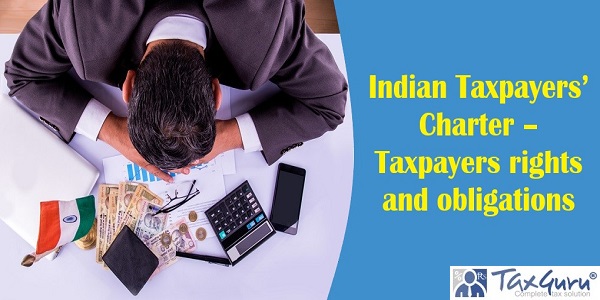Taxes are the lifeblood of any government, but it cannot be overemphasised that the blood is taken from the arteries of the taxpayers and therefore the transfusion has to be accompanied with the principles of justice and fair play – Nani Palkivala
The Indian Income Tax Act originally drafted in 1922 was later overhauled post-independence and a new Income Tax Act 1961 was born. Since then, the Act has been subjected to various amendments and changes. The main objective of any tax administration it’s to collect taxes from the taxpayers which can then be used for the social welfare and nation building. Over a period, governments throughout the world are moving towards more user friendly and technology driven system off collecting taxes.
The Tax Administration Reform Committee (TARC) headed by Dr. Parathasarathi Shome in the year 2014-15, submitted their recommendations for reforms in direct tax administration. Most of the recommendations of the committee is still to be implemented. The Taxpayers’ Charter is the result of the recommendation of the committee. The Taxpayers’ Charter was launched by our Honourable Prime Minister Narendra Modi on 13th August, 2020 with the slogan “Transparent Taxation – Honouring the Honest” and launching of Faceless Assessment, Faceless Appeal and Taxpayers’ Charter.

Honorable Finance Minister of India Ms Nirmala Sitharaman in 2020 said in her budget speech:
“An important aspect of both ease of living and ease of doing business is fairness and efficiency of tax administration. We wish to enshrine in the statutes a tax payer charter through this budget. Our government would like to reassure taxpayers that we remain committed to taking measures so that our citizens are free from harassment of any kind”.
Accordingly, a new Section 119A has been inserted by Finance Act 2020 in the Income Tax Act, 1961 which reads as under:
“119A: The Board shall adopt and declare a Taxpayers’ Charter and issue such orders, instructions, directions or guidelines to other Income tax authorities as it may deem fit for the administration of such Charter”.
Though section 119A recommends Board to declare the Taxpayers’ Charter, but as on day the taxpayers do not have any remedy if their rights are not met. However, with the issuance of appropriate instructions, guidelines, notifications etc under Section 119A, taxpayers rights may finally concretize.
The Taxpayers’ Charter comes with the rights of the taxpayers’ along with obligation too.
Salient feature of the Taxpayers’ Charter, 2020
The Income Tax Department is committed to
1. Provide fair, courteous, and reasonable treatment
The department shall provide prompt, courteous and professional assistance in all dealings with the taxpayers
2. Treat taxpayers as honest
the department shall treat every tax payer as honest unless there is a reason to believe otherwise.
3. Provide mechanism for appeal and review
the department shall provide fair and impartial appeal and review mechanism.
4. Provide complete and accurate information
The department shall provide accurate information for fulfilling compliance obligations under the law.
5. Provide timely decisions
The department shall take decisions in every income tax proceedings within the time prescribed under law.
6. Collect the correct amount of tax
The department should collect only the amount do as per the law.
7. Respect privacy of taxpayer
The department will follow due process of law and be no more intrusive than necessary in any enquiry examination or enforcement action.
8. Maintain confidentiality
The department should not disclose any information provided by the tax payer to the department unless authorised by law.
9. Hold its authorities accountable
The department said hold its authorities accountable for their actions.
10. Enable represented team of choice
The department shall allow every tax payer to choose an authorised representative of his choice.
11. Provide mechanism to launch complaint
The department shall provide mechanism for lodging a complaint and prompt disposal thereof.
12. Provide a fair and justice system
The department should provide a fair and impartial system and resolve the tax issues in a time bound manner.
13. Publish service standards and report periodically
The department should publish standards for service delivery in a periodic manner.
14. Reduce cost of compliance
The department shell Dooley take into account the cost of compliance when administrator tax legislation
The Income Tax Department expects taxpayers to
1. Be honest and complain
tax payer is expected to honestly disclose full information and fulfill his compliance obligations.
2. Be informed
tax payer is expected to be aware of his compliance obligations under tax law and seek help of department if needed.
3. Keep accurate records
Tax payer is expected to keep accurate records required as per law.
4. Know what the representative does on his behalf
Tax payer is expected to know what information and submissions are made by his authorised representative.
5. Respond in time
tax payer is expected to make submissions as per tax law in timely manner.
6. Pay in time
Tax payer is expected to pay amount due as per law in a timely manner.
Though the release of Taxpayers’ Charter is laudable, but there remains lot to be done. The Charter should be legally enforceable, so that taxpayers have an option to voice their concerns if there is any violation of their rights. It is more than a year since the launch of the Charter, but there are no directions issued by the department.
The introduction of faceless assessment, faceless appeal and faceless tribunal is all in the right directions of implementing the rights of the taxpayers by reducing the compliance burden and also providing equal opportunity to represent and to be fair. The Income Tax Department is the largest tax litigant and as per the recent survey nearly 85% of the total number of appeals filed is by the department and the success rate is very low. The high pitch assessments will be stopped only if the targeted approach of assessments is curtailed.
An easy answer to most of the administrative and tax payer concerns is to promote voluntary compliance based on mutual trust. The modern day tax environment is ever so dynamic it is pertinent therefore to implement real time tax compliance measures and facilitate modernised assessment and collection of taxes. There is already a substantial shift from the traditional approach of tax administration with the adoption of technology. The role of tax administration is also changing significantly. They are no longer auditors of outcomes, but rather have the role of being certified of the systems.
The Taxpayers’ Charter therefore is a great opportunity to build and preserve trust between the tax payer and the revenue department. It has the potential to offer practical measures for taxpayers in ensuring that the tax law is predictable, necessary and that its workability does not impose and undue burden on the taxpayers at large; it is integral to nation building while being deterrent for errant taxpayers. The charter apparently is an attempt to balance the expectations of the tax administration with obligations of the taxpayers. The efficacy of the Taxpayers’ Charter shall depend upon its effective implementation both in letter and in spirit. A lot will depend on how strongly these taxpayers rights and obligations are embedded in the system of tax administration in India.





